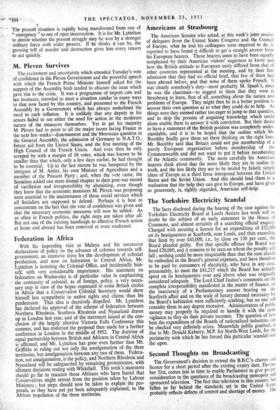Americans at Strasbourg
The American Senator who asked, at this week's joint session of delegates from the United States Congress and the Council of Europe, what he and his colleagues were required to do, is reported to have found it difficult to get a straight answer from his European hearers. Those hearers seem to have been equally nonplussed by their American visitors' eagerness to know just how the British attitude to European unity differed from that of other countries represented at the meeting, and by their free admission that they had no official brief, that few of them had been abroad before, and that none of them spoke French. It was-clearly somebody's duty—most probably M. Spaak's, since he was the chairman—to suggest to them that they were at Strasbourg to learn, first of all, something about the nature and problems of Europe. They might then be in a better position to answer their own question as to what they could do to help. As things were they seemed rather too eager to jump to that question, and to skip the process of acquiring knowledge which could alone enable them to answer it with conviction. But their desire to have a statement of the British position was completely under- standable, and it is to be hoped that the outline which Mr. Boothby finally gave them set them thinking on the right lines.
Mr. Boothby said that Britain could not put membership of a purely European organisation before membership of the commonwealth and did not want to put it before membership of the Atlantic community. The more carefully his American hearers think about that the more likely they are to realise its truth, and the less likely they are to be misled by falsely simple ideas of Europe as a third force interposed between the United States and the Soviet Union. And this should lead them to a realisation that the help they can give to Europe, and have given so generously, is, rightly regarded, American self-help.


































 Previous page
Previous page